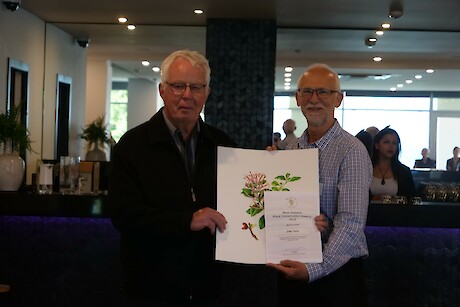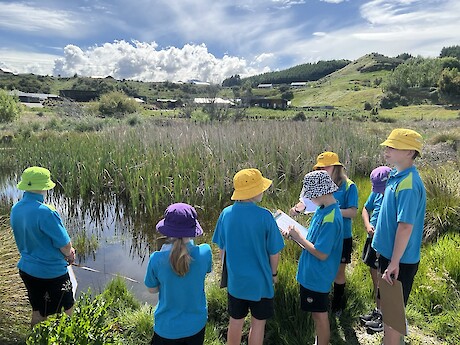NZPCN Award Winners 2022
Botanical greats, hard workers and inspirers of the next generation have all been honoured in the awards announced by the New Zealand Plant Conservation Network (NZPCN) in Queenstown this week.
The awards recognise special people, and projects that have captured the interest of local communities. These individuals and groups are the leading guardians of our country’s native plants and ecosystems. They include a Tongariro legend, and regionwide plant conservation initiative, a northland legendary botanist, a Queenstown primary school, a plant nursery in the Eastern Bay of Plenty, a Southland farmer and an enthusiastic young conservation leader.
These awards are indicative of the huge effort that is being exerted all around the country by a large number of dedicated individuals, communities and businesses to protect and enhance our unique native plants.
Individual
In 2022, the award for the ‘Individual Involved in Plant Conservation’ goes to Lisa Forester. Lisa’s knowledge of Te Taitokerau plant world is legendary. She has been an advocate for wetlands, gum lands, dune lakes, rare and threatened plants for over 40 years and instrumental in the protection of biodiversity in the Northland Region.
Lisa is a fabulous mentor and teacher, always taking time to teach others and loves to share her knowledge with agency staff, iwi, and the wider community. She has an important influence on the plant world in Northland and shares their respect and passion for Te Ao Māori, incorporating it into her everyday life. As Biosecurity Manager at Northland Regional Council she is well placed to lead and influence a team to achieve sustainable outcomes in Coastcare, biodiversity, and water quality.
Lisa has made a large contribution of 1,900 specimens to the Auckland Herbarium collection and has played a part in discovering many unusual plants in Te Taitokerau. She has written and contributed to many articles and papers on plants and forest health.
With a fondness for Northland’s dunes lakes, Lisa has helped improve the public appreciation and understanding of these incredibly special places. Her advice on their restoration, delineation, and biosecurity continues to be crucial in their protection.
Lifetime Achievement Award
Paul Green has been awarded a ‘Life Time Achievement’ award by the Network for the work done through numerous roles within Project Tongariro. This not-for-profit organisation is focused on restoring the mauri of Tongariro National Park and its surroundings. It includes flagship projects such as Te Mātāpuna Wetland, Greening Taupō and Lake Rotopounamu Restoration Project. Strong partnerships with the Department of Conservation, regional and local councils and iwi have allowed Project Tongariro to achieve volunteer participation on conservation projects that protect flora restoration and pest control. Paul unfailing gives of his time and wisdom to support these projects. His mana in the local community, extensive connections and ability to think and work strategically are invaluable. His unfailing work to protect the biodiversity of the Central North Island goes on.
Through his strategic leadership, encouragement, and endless dedication. Paul provides opportunities for conservation specialists and volunteers, actively supports public participation and education, is out planting and connecting key agencies to achieve conservation outcomes at scale. And encouraging others to do so too. Paul is a well-deserved recipient of this award.
Special Award
 John Cowie receiving award from NZPCN president John Barkla. Photo: Taylor Davies-ColleyA special award this year goes to John Cowie for the work he has done over many decades to protect pockets of native vegetation and special habitat areas on his family farm Ōtāpiri Farm at East Limehills in Southland.
John Cowie receiving award from NZPCN president John Barkla. Photo: Taylor Davies-ColleyA special award this year goes to John Cowie for the work he has done over many decades to protect pockets of native vegetation and special habitat areas on his family farm Ōtāpiri Farm at East Limehills in Southland.
John has successfully combined legal protection with active stewardship of the many special areas on his property that include rare riparian forest and dry forest on limestone. He has collaborated with DOC to work out ways to improve the regeneration prospects of several threatened plant species he has on his farm.
John has fenced many areas along the Ōtāpiri Stream in an enlightened manner that recognises the wild and dynamic nature of the stream. In so doing he has utilised the role it plays in creating conditions necessary for some of the threatened riparian plants to survive.
John is a quiet leader in the Southland farming community and prefers to ‘lead by doing’, an approach that is both inspiring and credible amongst his farming peers and other landowners. With his longstanding commitment to protecting threatened ecosystems and their special plants, and inspiring others to do the same. John is a well-deserving recipient of this award.
Plant Nursery
Coastlands Plant Nursery have won the ‘Plant Nursery Involved in Plant Conservation’ award for their amazing ability to grow and provide eco-sourced native plants, including threatened species from seed or cuttings on request. They specialise in supplying quality eco-sourced native plants for sand dune restoration and coastal erosion and produce some 500,000 plants annually. In the summer they travel all over the North Island and top of the South Island collecting spinifex, pīngao, and other dune plant species. They have grown many threatened plant species over the years for specific projects for planting back into natural areas, including sand daphne, sand coprosma, Olearia pachyphylla, and native spinach. Coastlands love what they do and nothing is too difficult; if it’s a species hard to grow or on the brink of extinction they are happy to grow it for you.
Jo Bonner, the owner manager, is very experienced, knowledgeable, and passionate about plants and ensures that all stock is ecosourced and planted back in the appropriate Region. Coastlands grow plants for many regions throughout the North Island and top of the South Island, all of which is rigorously tracked from collection to dispatch to ensure ecosourcing.
Community Group
The NZPCN’s ‘Community Plant Conservation Project’ award has gone to Project Tongariro for their outstanding work done to protect the native biodiversity of the Tongariro National Park and its World Heritage sites. Originally named the Tongariro Natural History Society, it was founded in memory of four people who were tragically killed in a helicopter crash in 1984, and was initially made up of friends and colleagues of those killed. From its modest beginnings, assisting with the running of summer programmes and taking visitors on field trips to the unique corners of Tongariro National Park (TNP), Project Tongariro has grown over the following decades and now has a much bigger impact on conservation work in the Region, including the restoration of the Alpine Garden at Whakapapa.
Project Tongariro took on the prime responsibility for the ongoing restoration of Rotopounamu-Pihanga, an important podocarp forest in Tongariro National Park. Their work has had a significant impact and involved surveys, monitoring, and possum control. A trapping network was established and extended over Mt Pihanga as well as a three-year aerial poisoning programme. All this work has taken them closer to their goal of reintroducing endangered species. Project Tongariro have also worked at the large 1,500 hectare Te Mātāpuna Wetlands, adjacent to Lake Taupō, forming important partnerships with DOC and local iwi. Funding from DOC, Waikato Regional Council, and Waikato Catchment Ecological Enhancement Trust enabled them to carry out willow control and restoration planting of a variety of native species. Other projects Project Tongariro have been involved in include the revegetation of the Lord of the Rings film sites on Mt Ruapehu; a weed project at the site of the old Whanganui Bridge SH47; ongoing flora monitoring and propagation; and the coordination of all volunteers in TNP.
Project Tongariro has also been able to support the work of others with funding applications, financial management and administration support, including staffing. This has led to the establishment of community projects such as Kids Greening Taupō and Predator Free Taupō. Project Tongariro is a hugely successful environment/conservation group that has had an extraordinary and positive impact.
School
 Shotover Primary School Enviro Leaders (Year 7 and 8) learning about how to monitor environmental health indicators at Shotover Wetland so they can teach other students. Photo: Shotover Primary School.The ‘School Plant Conservation Project’ award went to Shotover Primary School in Queenstown. In 2016 the regionally significant Shotover wetland (nestled within a growing urban community), was identified as a restoration project for the school. The planting of 2,500 eco-sourced plants around the periphery of the wetland has been achieved by the removal of introduced weed species and the staged planting of appropriate native eco-sourced species. The students are also involved with the monitoring of environmental health indicators.
Shotover Primary School Enviro Leaders (Year 7 and 8) learning about how to monitor environmental health indicators at Shotover Wetland so they can teach other students. Photo: Shotover Primary School.The ‘School Plant Conservation Project’ award went to Shotover Primary School in Queenstown. In 2016 the regionally significant Shotover wetland (nestled within a growing urban community), was identified as a restoration project for the school. The planting of 2,500 eco-sourced plants around the periphery of the wetland has been achieved by the removal of introduced weed species and the staged planting of appropriate native eco-sourced species. The students are also involved with the monitoring of environmental health indicators.
Ongoing engagement with local community and businesses has increased the awareness of the importance of these natural ecosystems and has acted as a catalyst for behavioural change amongst the wider community. The success of this project has now attracted corporate support both financially and physically to help the school achieve their 10-year plan of 4,500 plants around the wetlands.
This project has encouraged the students to take control of the school’s internal landscaping. Students have spearheaded the design, planning, planting, and maintenance of the school grounds with approx. 1,500 eco-sourced natives planted over three years.
Through the Whakatipu Reforestation Trusts “Educate for Nature” programme, the students attend regular field trips to various ecosystems throughout the year to learn about specialised plant and animal communities and the management required to protect and preserve them.
They have their own nursery and have begun collecting and propagating plants and are keen to share their expertise with other interested groups.
Young Plant Conservationist
The award for “Young Plant Conservationist of The Year” goes to Audrey Austin. Audrey has been an active member of the Shotover Primary School enviro team from a young age, attending all the local community planting days across the Whakatipu Basin in her own time at weekends, the school holidays, as well as our school planting days at local wetlands. Audrey works in the school garden and grounds every lunch time, helping to plant native seeds, prick out seedlings, pot on, weed, and mulch. She has amazing leadership skills and works with our younger students, teaching them the skills to look after and grow natives to plant in her local area. She has an amazing knowledge of both flora and fauna. Audrey also volunteers at the Kiwi Bird Life Park in her spare time. She is extremely curious and with her inquiring mind loves to identify and seek solutions to environmental issues.
For more information contact awards coordinators Sarah Beadel: Phone 021 924 476 Email: [Enable JavaScript to view protected content]
